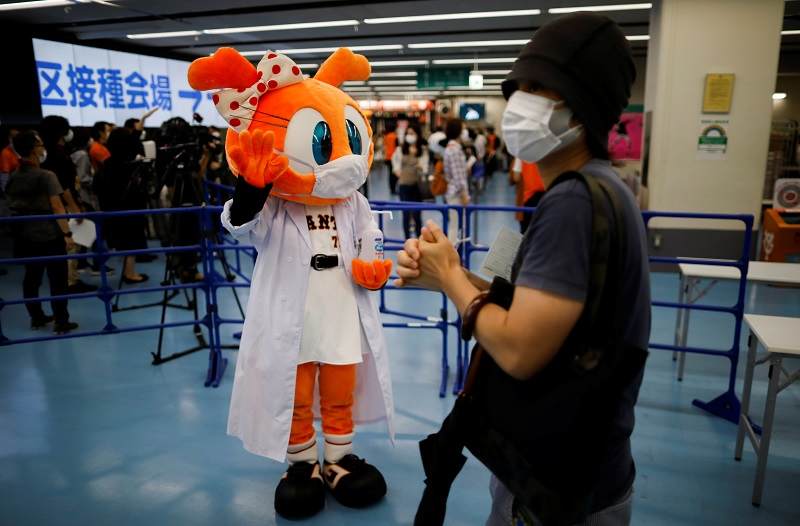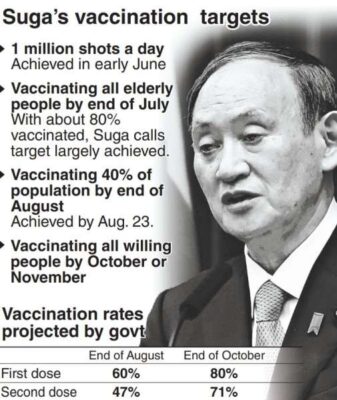
Sister Giabbit, a mascot of the Japanese professional baseball team Yomiuri Giants, wearing clothes symbolising a medial professional, greets people at the entrance of the Tokyo Dome, the home ground of the team which is which is currently being used as a large-scale coronavirus disease (COVID-19) vaccination center, in Tokyo, Japan, August 16, 2021.
13:55 JST, August 27, 2021
As of Monday, about 40% of the country’s population had received two doses of coronavirus vaccine. Prime Minister Yoshihide Suga sees vaccinations as the decisive factor in the battle against the pandemic.
The next target is to administer vaccines to everyone in Japan who wants to be inoculated. Improving vaccination rates among young people will be key in this endeavor.
According to government statistics, 40.7% of the overall population had received two doses of vaccine as of Monday, when the statistics were released. The 40% milestone was achieved a week earlier than the government’s target of the end of August.
So far, the government has achieved two of its vaccination goals — administering 1 million shots per day and vaccinating all elderly people by the end of July.
The achievement of the 40% vaccination rate would give further momentum toward Suga’s target of giving two doses of vaccine to all willing people by October or early November.
Mass vaccinations by municipalities, companies and universities had to be suspended at one time due to the government’s inaccurate estimate of vaccine supplies. Of 5,202 entities that had submitted applications to start workplace vaccination programs, 1,091 had withdrawn them as of Wednesday. Those applications would have covered millions of people.

An artist illustration : Suga’s vaccination targets
Delta thwarts hopes
Suga has been focusing on the 40% vaccination rate because overseas cases suggested clear benefits in preventing the spread of infections when that level of inoculation was achieved. However, the spread of the more infectious delta variant has thwarted Suga’s hopes.
New cases of infection remain at high levels, and 33 prefectures including Tokyo are under either a state of emergency or less strict priority measures.
However, vaccinations have been proved effective. According to an analysis by the Health, Labor and Welfare Ministry, the mortality rate among infected elderly people aged 65 and older who received two doses of vaccine is about one-fifth that of elderly people who have not been vaccinated.
Chief Cabinet Secretary Katsunobu Kato said at a press conference Monday, “We will make all-out efforts to distribute vaccines smoothly in cooperation with municipalities and healthcare professionals. ”
Young people key
Further improving vaccination rates is a challenge. At a press conference on Aug. 17, Suga suggested that two doses of vaccine would be given to nearly half of Japan’s population by the end of August and to nearly 60% by the end of September. The government estimates that 71% of the country’s population will get two doses by the end of October.
However, there are concerns that vaccination rates might plateau after September. Young people don’t want to experience the side effects of inoculation, and they have a lower risk of developing severe COVID-19 symptoms compared to elderly people. For these reasons, young people are said to be hesitant to get shots.
The government is working hard to reach out to young people through YouTube and other media.
“The coronavirus vaccine is 95% effective. It really works, so we want young people to be vaccinated,” Taro Kono, minister in charge of administrative reform and regulatory reform, said in a YouTube video.
Popular YouTuber Hajime Shacho appears as an interviewer in the about 15-minute video. He asks Kono about the benefits and side effects and says, “Now I want to get vaccinated, too.”
The video was released on YouTube in early July, and has been viewed more than 4 million times.
To refute rumors about coronavirus vaccines, such as that inoculation causes infertility, the government created another video featuring a female cooking influencer on YouTube who is popular among women in their 20s and 30s. It wants to increase vaccination rates among young people by creating more videos and sharing them on social media and other platforms.
Nations struggling to hit 70%
In Israel, which started vaccinations at the beginning of this year with the fastest pace in the world, more than 50% of the population had received the required doses by mid-March. However, its vaccination rate has been slow to grow since then and now remains at 63%.
Other countries also saw their vaccination rates plateau, at 51% in the United States and 61% in Britain. Countries promoting vaccination rollouts ahead of Japan are seeing their rates stagnate at 50% to 70% of the total population.
Germany is a typical example. Our World in Data, joined by the University of Oxford and other institutions, found that the number of people receiving the required doses of vaccine in June alone reached about 16 million, but the number fell to about 4 million over the first half of August. German Chancellor Angela Merkel has expressed concern over the slower pace.
At first, vaccination rollouts progress rapidly among elderly people, healthcare professionals and other priority groups. After that, countries face the issue of promoting vaccination among people who are against vaccines or concerned about their safety, and among young people, who a U.S. expert says don’t feel as much urgency because they are less likely than elderly people to get seriously ill.
In the United States, some states have provided cash incentives for people to get vaccinated, which resulted in higher inoculation rates. At the end of July, U.S. President Joe Biden asked local governments to pay people $100 (about ¥11,000) to get vaccinated.
There are other aggressive moves to get people vaccinated. New York City has announced that people 12 and older must show proof they have received at least one dose of a COVID-19 vaccine for indoor activities like dining. U.S. IT giants such as Google LLC and Facebook Inc. are requiring employees who come into the office to be vaccinated.
In Europe, a health pass and other proofs of vaccination are being used for dining and other purposes in many countries. Germany has been conducting free antigen tests since this spring, but it will stop providing them for free, in principle, on Oct. 11. By making citizens pay for the tests, Germany is aiming to push them toward getting vaccinated for greater convenience.
Top Articles in Society
-

Man Infected with Measles Reportedly Dined at Restaurant in Tokyo Station
-

Man Infected with Measles May Have Come in Contact with Many People in Tokyo, Went to Store, Restaurant Around When Symptoms Emerged
-

Woman with Measles Visited Hospital in Tokyo Multiple Times Before Being Diagnosed with Disease
-

Australian Woman Dies After Mishap on Ski Lift in Nagano Prefecture
-

Foreign Snowboarder in Serious Condition After Hanging in Midair from Chairlift in Nagano Prefecture
JN ACCESS RANKING
-

Japan PM Takaichi’s Cabinet Resigns en Masse
-

Japan Institute to Use Domestic Commercial Optical Lattice Clock to Set Japan Standard Time
-

Israeli Ambassador to Japan Speaks about Japan’s Role in the Reconstruction of Gaza
-

Man Infected with Measles Reportedly Dined at Restaurant in Tokyo Station
-

Videos Plagiarized, Reposted with False Subtitles Claiming ‘Ryukyu Belongs to China’; Anti-China False Information Also Posted in Japan






















